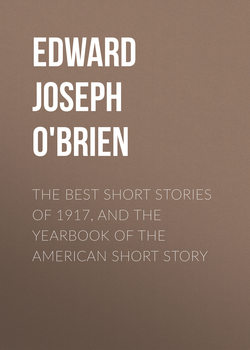The Best Short Stories of 1917, and the Yearbook of the American Short Story

Реклама. ООО «ЛитРес», ИНН: 7719571260.
Оглавление
Edward Joseph Harrington O'Brien. The Best Short Stories of 1917, and the Yearbook of the American Short Story
INTRODUCTION
THE BEST SHORT STORIES OF 1917
THE EXCURSION1
ONNIE2
A CUP OF TEA3
LONELY PLACES4
BOYS WILL BE BOYS5
LAUGHTER6
THE EMPEROR OF ELAM7
I
II
III
IV
V
VI
VII
THE GAY OLD DOG8
THE KNIGHT'S MOVE9
I
II
III
IV
A JURY OF HER PEERS10
THE BUNKER MOUSE11
RAINBOW PETE12
GET READY THE WREATHS13
THE STRANGE-LOOKING MAN14
THE CALLER IN THE NIGHT15
THE INTERVAL16
"A CERTAIN RICH MAN–"17
THE PATH OF GLORY18
II
III
IV
V
CHING, CHING, CHINAMAN19
NONE SO BLIND20
THE YEARBOOK OF THE AMERICAN SHORT STORY FOR 1917. ADDRESSES OF AMERICAN MAGAZINES PUBLISHING SHORT STORIES
THE BIOGRAPHICAL ROLL OF HONOR OF AMERICAN SHORT STORIES FOR 1917
THE ROLL OF HONOR OF FOREIGN SHORT STORIES IN AMERICAN MAGAZINES FOR 1917
THE BEST BOOKS OF SHORT STORIES OF 1917: A CRITICAL ANALYSIS
VOLUMES OF SHORT STORIES PUBLISHED DURING 1917
THE BEST SIXTY-THREE AMERICAN SHORT STORIES OF 1917
MAGAZINE AVERAGES FOR 1917
INDEX OF SHORT STORIES FOR 1917
Отрывок из книги
A year ago, in the introduction to "The Best Short Stories of 1916," I pointed out that the American short story cannot be reduced to a literary formula, because the art in which it finds its concrete embodiment is a growing art. The critic, when he approaches American literature, cannot regard it as he can regard any foreign literature. Setting aside the question of whether our cosmopolitan population, with its widely different kinds of racial heritage, is at an advantage or a disadvantage because of its conflicting traditions, we must accept the variety in substance and attempt to find in it a new kind of national unity, hitherto unknown in the history of the world. The message voiced in President Wilson's words on several occasions during the past year is a true reflection of the message implicit in American literature. Various in substance, it finds its unity in the new freedom of democracy, and English and French, German and Slav, Italian and Scandinavian bring to the common melting-pot ideals which are fused in a national unity of democratic utterance.
It is inevitable, therefore, that in this stage of our national literary development, our newly conscious speech lacks the sophisticated technique of older literatures. But, perhaps because of this very limitation, it is much more alert to the variety and life of the human substance with which it deals. It does not take the whole of life for granted and it often reveals the fresh naïveté of childhood in its discovery of life. When its sophistication is complete, it is the sophistication of English rather than of American literature, and is derivative rather than original, for the most part, in its criticism of life. I would specifically except, however, from this criticism the work of three writers, at least, whose sophistication is the embodiment of a new American technique. Katharine Fullerton Gerould, Wilbur Daniel Steele, and H. G. Dwight have each attained a distinction in our contemporary literature which places them at the head of their craft.
.....
Mrs. Tinneray, jaw set, eyes rolling, was able to intimate that she needed no lemon, but she drew her husband mysteriously aside. She fixed him with a foreboding glare, she said it was a wonder the Lord didn't sink the boat! Then she rapidly sketched the tragedy—Mrs. Tuttle serene and pampered on the deck, and Hetty Cronney desolate on the wharf! She pronounced verdict.
"It's terrible—that's what it is!"
.....